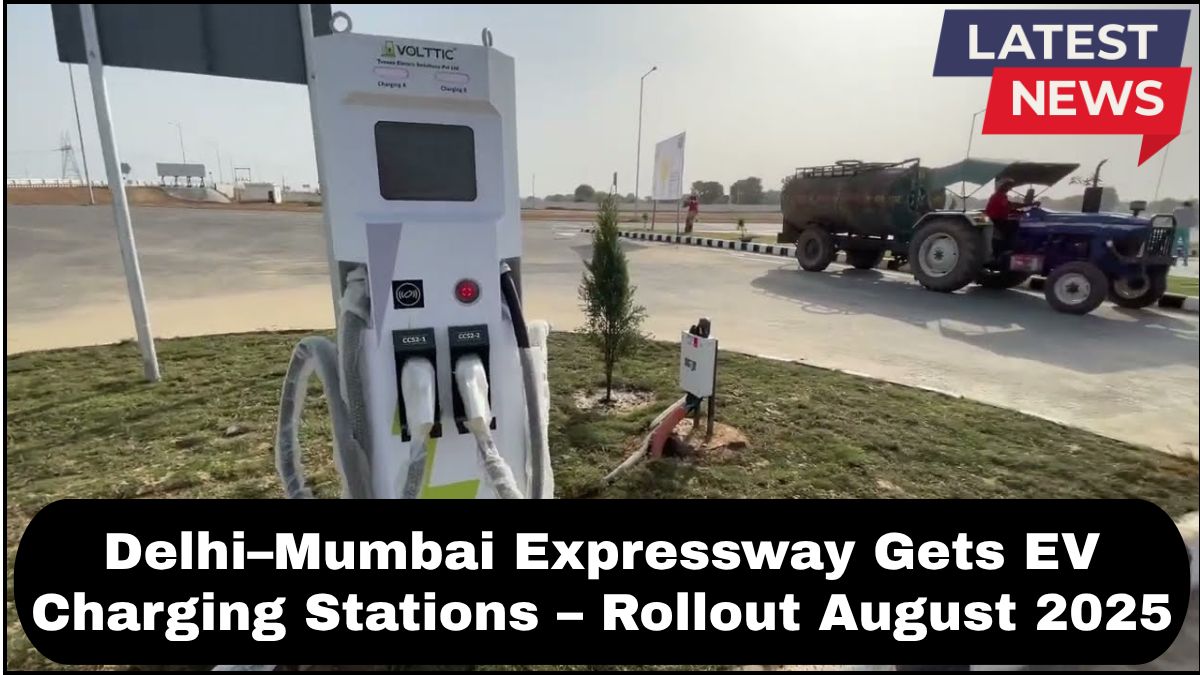India’s electric vehicle (EV) ecosystem is about to take a major leap forward. The ambitious Delhi–Mumbai Expressway, one of India’s longest and most advanced road projects, is set to roll out EV charging stations along its full stretch by August 2025. This move is a significant milestone in India’s broader strategy to build a robust network of EV charging highways, encouraging clean mobility on intercity routes.

A Step Toward Sustainable Highway Infrastructure
As the demand for electric vehicles continues to grow, the availability of reliable charging infrastructure becomes crucial—especially on long-distance routes. The Delhi–Mumbai route, spanning approximately 1,386 kilometers, connects key economic zones across Delhi, Rajasthan, Madhya Pradesh, Gujarat, and Maharashtra. Installing EV charging stations along this route will make it the longest EV-ready corridor in India.
This initiative is part of a larger effort by the National Highways Authority of India (NHAI) and the Ministry of Road Transport and Highways to create Green Corridors. The goal is not just to support EV adoption but also to cut down carbon emissions on some of the country’s busiest highways.
What to Expect from the Charging Infrastructure
According to government officials, each charging station will be equipped with:
-
Multiple fast chargers (CCS2 and CHAdeMO compatible)
-
Battery swapping facilities in select locations
-
24/7 operation with security and surveillance
-
Digital payment options and app-based reservations
-
Amenities such as restrooms, cafes, and waiting lounges
These stations will be spaced roughly every 40 to 60 kilometers, ensuring that even vehicles with smaller battery ranges can complete the journey without range anxiety.
Boost for Intercity EV Travel
One of the persistent barriers to EV adoption in India has been the lack of confidence around long-distance travel. By upgrading the Delhi–Mumbai route into a fully EV-compatible corridor, the government is directly addressing this concern.
The expressway’s integration with EV charging highways also opens up new commercial and tourism opportunities. From logistics companies to individual travelers, the benefits will ripple across multiple sectors. For instance, intercity electric buses and delivery fleets can operate more efficiently and cost-effectively once high-speed charging becomes readily available along their routes.
Public-Private Partnerships Paving the Way
The development of EV charging infrastructure along the expressway is being powered through Public-Private Partnerships (PPPs). Key players in the EV and energy sectors—including Tata Power, ChargeZone, and Fortum—are actively involved in bidding and construction.
These partnerships are expected to not only accelerate deployment but also ensure world-class service standards. Companies are incentivized to innovate in areas like ultra-fast charging and solar-powered stations to make these hubs even more sustainable.
Integration with India’s EV Policy Goals
The expressway upgrade aligns seamlessly with India’s broader EV policy framework:
-
FAME II Scheme: Provides subsidies for EVs and infrastructure.
-
Battery Swapping Policy: Encourages modular energy delivery.
-
State EV Policies: Maharashtra, Gujarat, and Delhi already offer additional incentives for EV users.
By creating EV charging highways like this one, the government is building the backbone required to hit its 2030 target—where 30% of all vehicles sold in India will be electric.
What This Means for EV Owners
EV owners traveling the Delhi–Mumbai route can expect:
-
Seamless travel with minimal charging downtime
-
Lower operational costs compared to ICE vehicles
-
Enhanced safety and service support across charging stations
-
Real-time updates via mobile apps on station availability
This is a game-changer for anyone considering the shift to electric—turning one of the most traveled highways in India into a reliable, EV-friendly corridor.
FAQs
Q1: Will all types of EVs be able to charge along the Delhi–Mumbai Expressway?
Yes, the charging stations will support all major EV formats, including two-wheelers, passenger cars, and commercial vehicles. Fast chargers compatible with CCS2 and CHAdeMO will be standard.
Q2: How often will the charging stations be placed?
EV charging stations will be placed every 40–60 kilometers to ensure convenient access across the entire expressway.
Q3: Will there be mobile app support for locating and booking charging slots?
Absolutely. Most operators will offer mobile apps that show real-time charger availability, pricing, and booking options.
Q4: Is this part of a larger plan for EV charging highways in India?
Yes, the Delhi–Mumbai Expressway is one piece of a national strategy to electrify India’s major highways, connecting Tier-1 and Tier-2 cities through green corridors.
Q5: What happens if a vehicle breaks down or runs out of charge?
Roadside assistance, including mobile charging vans, will be deployed along the route to ensure EVs can complete their journey safely.
click here to learn more